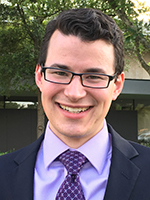David Cassazza
2019 Temple Bar Scholar Report
 For many lawyers, the legal profession can be a parochial life. State and national borders set limits on our professional communities. The Temple Bar program allowed each of the scholars to transcend those geographical limits and build connections in a truly transatlantic legal network. Over the course of the program, we engaged with British lawyers in a variety of private and public roles—members of the judiciary and members of Parliament, commercial and criminal barristers, legal academics and administrators.
For many lawyers, the legal profession can be a parochial life. State and national borders set limits on our professional communities. The Temple Bar program allowed each of the scholars to transcend those geographical limits and build connections in a truly transatlantic legal network. Over the course of the program, we engaged with British lawyers in a variety of private and public roles—members of the judiciary and members of Parliament, commercial and criminal barristers, legal academics and administrators.
We opened the program with a grand tour of London’s legal society. Over the course of a week we met with the leadership of each Inn of Court, a wide range of barristers in private practice, and judges from all of the major London courts. We sat in on a homicide trial, spoke with the Lord Chief Justice, and fielded questions from the President of the Supreme Court of the United Kingdom. The capstone of this tour was the formal opening of the legal year, when we gathered at Westminster Abbey with judges from all across the country to celebrate and sanctify the opening of the new legal term.
Over the next two weeks, we shadowed commercial barristers in private practice. These two weeks gave us an up-close introduction to the practice of law in London. The range of a barrister’s practice and the centrality of oral advocacy set the British barrister apart from the American trial attorney. Over the course of the two weeks, I observed an international dispute between eastern European oligarchs, a contract case between a multinational sportswear company and a major English football club, a post-judgment hearing in a lawsuit concerning judicial pensions, and settlement negotiations over a contested inheritance. I was introduced to English and European law and the shifting relationship between the two at a time of great change in the legal landscape. And I was able to see the split profession in action during daylong conferences between barristers, solicitors, and clients in a long-running multi-billion-pound pension lawsuit.
In our final week, we were welcomed by the Justices of the Supreme Court of the United Kingdom. We joined our host justice in chambers throughout the week, attended several days of oral argument, and listened in on some of the conferences alongside the Justices’ clerks. The Justices were remarkably generous with their time and were eager to speak with us about their work and their careers. It was fascinating to share an insider’s view of the Supreme Court, still a relatively new institution defining its role in an ancient legal system.
Through the program we were all introduced to the British legal system and to the practice of law in a truly transnational setting. Our hosts both in private practice and in the judiciary were remarkably gracious. The connections we made will be enduring, as will our view of the law as a global community.
David W. Casazza was a law clerk to Associate Justice Samuel A. Alito of the Supreme Court of the United States in 2018. Before that, he was an associate attorney for the Washington, D.C., firm Gibson Dunn & Crutcher LLP and a law clerk for Judge Jennifer Walker Elrod of the U.S. Court of Appeals for the Fifth Circuit. He was a law clerk for Senator Mike Lee, working with the Senate Judiciary Committee. He also spent a summer as an intern in the office of Senator Kirsten Gillibrand. Casazza graduated magna cum laude from Harvard Law School. He also earned a master’s degree with distinction in history from Johns Hopkins University and an undergraduate degree magna cum laude in history with a certificate in German from Princeton.